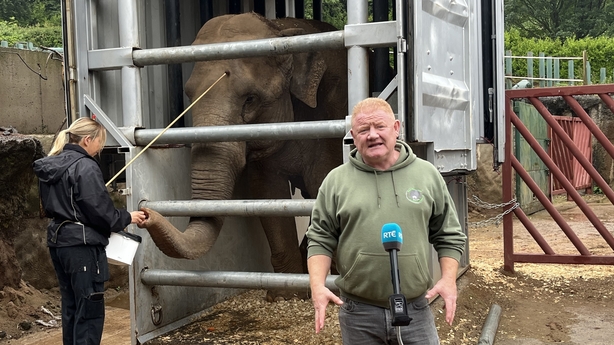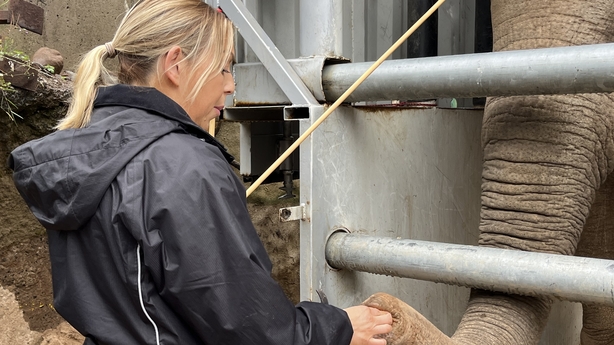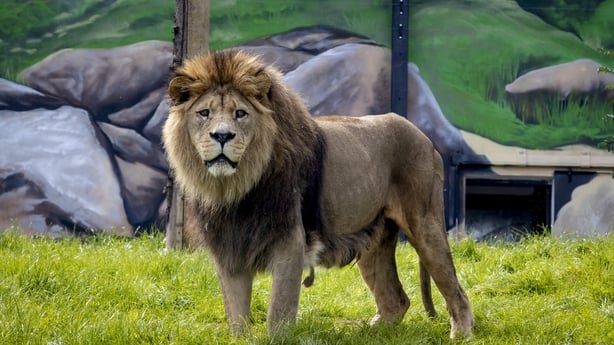It is the end of an era at Belfast Zoo this week as it says farewell to its two elephants, or the "golden girls" as they have been called.
Yhetto and Dhunja are packing their trunks and saying goodbye.
Aged 48 and 51, they are being moved to a zoo in the Netherlands that specialises in treating older elephants, basically a nursing and retirement home.
They will join two other old females, Saba and Oinky, to form a new herd of four, which is said to be the ideal social structure for older female elephants in their later years.
"It was a very tough decision because Yhetto and Dhunja are part of the history of the zoo and are very popular, but for the geriatric care that these elephants are going to need for the remainder of their lives it's the correct decision," said Gerry Creighton of Global Elephant Care.
"It's gonna be like the Golden Girls retirement home, they'll do very well there. A life management plan will be put in place and they will get wonderful care from a specialist team.

"This is going to give them the optimum chance to be in a proper social herd with a landscape and habitat that suits their needs at this stage of their life," he said.
Mr Creighton visited the zoo in Arnhem where Yhetto and Dhunja will spend their remaining years and has put them through a seven-week training programme to familiarise them with the purpose-built metal containers that will be used to transport them.
The Asian elephants have been trained to walk into the crates and to allow zoo keepers to attach legs bracelets and chains to keep them safe during the 48 journey by road and sea.
It is a process that has involved lots of treats as incentives such as carrots, turnips, bananas, bread and melons.
"They really love the bananas," said Senior Elephant Keeper Lynsey Perkins as Dhjuna cast aside a chunk of carrot and took a chunk of banana instead.
Yhetto has been trained to reverse into her crate so the two elephants can face each other when the crates are loaded onto a lorry on Wednesday.
"They have spent many years together and are very dependent on each other so being able to touch their trunks and see each other will make the journey less stressful," Mr Creighton explained.
"We've had them in and out of the crates a lot to familiarise them, to get them used to the surroundings and the noise of the chains rattling and that has worked very well," he said.
They will be accompanied by Ms Perkins, another zoo keeper and a vet who will unload them in Arnhem and be on hand to help them integrate into their new herd.

"Even when they're on the ferry myself, Ashleigh and the vet will have constant access to them and will take it in two-hour shifts to go down and check on them, feed them and make sure they are ok," said Lynsey Perkins.
"We will then take off the bracelets and chains and get them out of the crates because they know as and that means they are more likely to be compliant and won't be as nervous as they would be with strangers."
The keepers will then say their own final farewell.
"It's not going to be easy, you really get attached to them," said Ms Perkins.
"I've worked with them for 11 years and my colleague Ashleigh has worked with them for about 20 years and they are going to be a big loss and it's going to be very difficult on the day to say goodbye.
"But the way we're looking at it is, and the thing we have to remember, is that it's in their best interest. They're going somewhere where the terrain is a lot flatter, they have a pool for exercise and the climate is much better for them.
"They will be cared for by a team of keepers specialising in geriatric elephants so it is the best place for them to spend the rest of their lives," she said.
A series of special activities have been held in recent weeks to allow visitors to say a final farewell to two of the zoo's oldest and most popular animals.
However, this is not just the end of an era for Dhjuna and Yhello, it is the end of the era of elephants at Belfast Zoo, which has been homing them since opening its doors in 1934.

It was the first zoo in Ireland to successfully breed elephants, with the birth of Vishesh in 1997 and became a sanctuary for elderly non-breeding female elephants in 2008.
Information panels tell the story of its most famous elephant, a baby called Sheila.
When German bombers targeted Belfast during World War II, one of the zoo keepers, later nicknamed "the elephant angel", walked Sheila to her home a short distance away on the Whitewell Road and kept her safe in her backyard and walked her back the following morning.
Management at the zoo, which is owned and operated by Belfast City Council, is keen to stress that there are more than 100 other species for visitors to see and admire, including three Barbary lions which are extinct in the wild.
No decision has been taken about what animals will take up residence in the elephant enclosure but rhinos are believed to be a possibility.
"Our council remains committed to developing the Zoo as one of Northern Ireland's leading visitor attractions," said the city's Lord Mayor Micky Murray.
"And to championing it's pioneering work as an outstanding conservation facility with a proven track record in protecting and breeding species, many of which are extinct or endangered in the wild," he added.
However, the days of elephants in Belfast are gone.
Like Sheila and her "angel", by the end of this week, Yhetto and Dhunja will also be part of its history and like elephants, history never forgets.
We need your consent to load this rte-player contentWe use rte-player to manage extra content that can set cookies on your device and collect data about your activity. Please review their details and accept them to load the content.Manage Preferences







